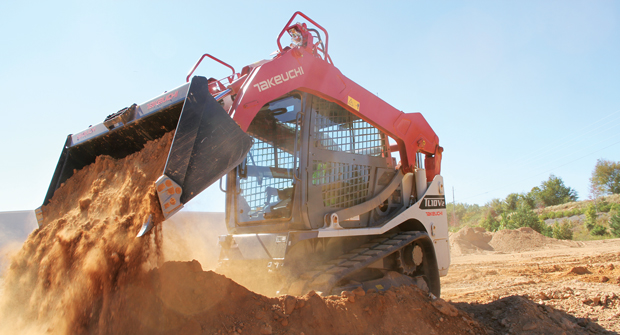With the landscaping industry still riding the wave that started amid the pandemic, contractors are still deciding whether to add new services. Digging deeper into that decision unearths another question — should you rent before you decide?
Lee Padgett, product manager at Takeuchi-US, shares his thoughts on the questions you should look to answer before deciding on that final big question.
To rent or not to rent?
Padgett says a contractor should consider a few questions before deciding whether to purchase or rent a machine. It starts with how often the machine will be used and unfolds from there.
“First, how often do you think you’ll use the machine? Secondly, what can you afford?” he says. “If you’re only going to use a compact excavator or track loader occasionally, then renting a machine to complete a job or several jobs may suffice. But if you plan on expanding your business with services that require a lot of digging and lifting, it’s probably time to invest in a machine of your own.”

Contractors should also understand what services they offer now and those they may want to offer in the future.
“As your business grows, you may discover the opportunity to provide additional services or work on larger projects that require a bigger, more capable unit with a greater working range,” he says.
This brings another benefit of renting into view — the contractor’s ability to get a hands-on test experience with a piece of equipment before they make a large dollar commitment.
Accessories are another potential thing to consider, depending on the piece of equipment that a contractor is renting. Other things to consider include your ability to transport the equipment you rent and for how long you’ll need it.
“Transporting a larger machine will also require a bigger and likely more expensive trailer,” says Padgett.
“Furthermore, operating a single vehicle weighing more than 26,000 lbs. — which includes the combination of a truck, trailer and anything being towed — requires a commercial driver’s license, a process that will require more time and effort.”
State of the market
According to the American Rental Association (ARA)‘s latest economic forecast, the market for renting equipment has begun to soften.
“Largely what we’re seeing is softening growth as well. We’re seeing pricing elasticity,” Kurt Barney, president of Vandalia (Ohio) Rental, tells the ARA. “It’s no longer, ‘Do you have it?’ We’re back to doing business like 2019 when we have to really communicate the value proposition of working with us.”
Barney adds that the rental market should rebound as interest rates continue to decline, despite the softening profits.
“We’re balancing rate pressures, supply chain and mix of the fleet in a softening environment, especially on the earthmoving side,” he continues. “The rental model and proposition have never been stronger. It’s a good place to be.”


